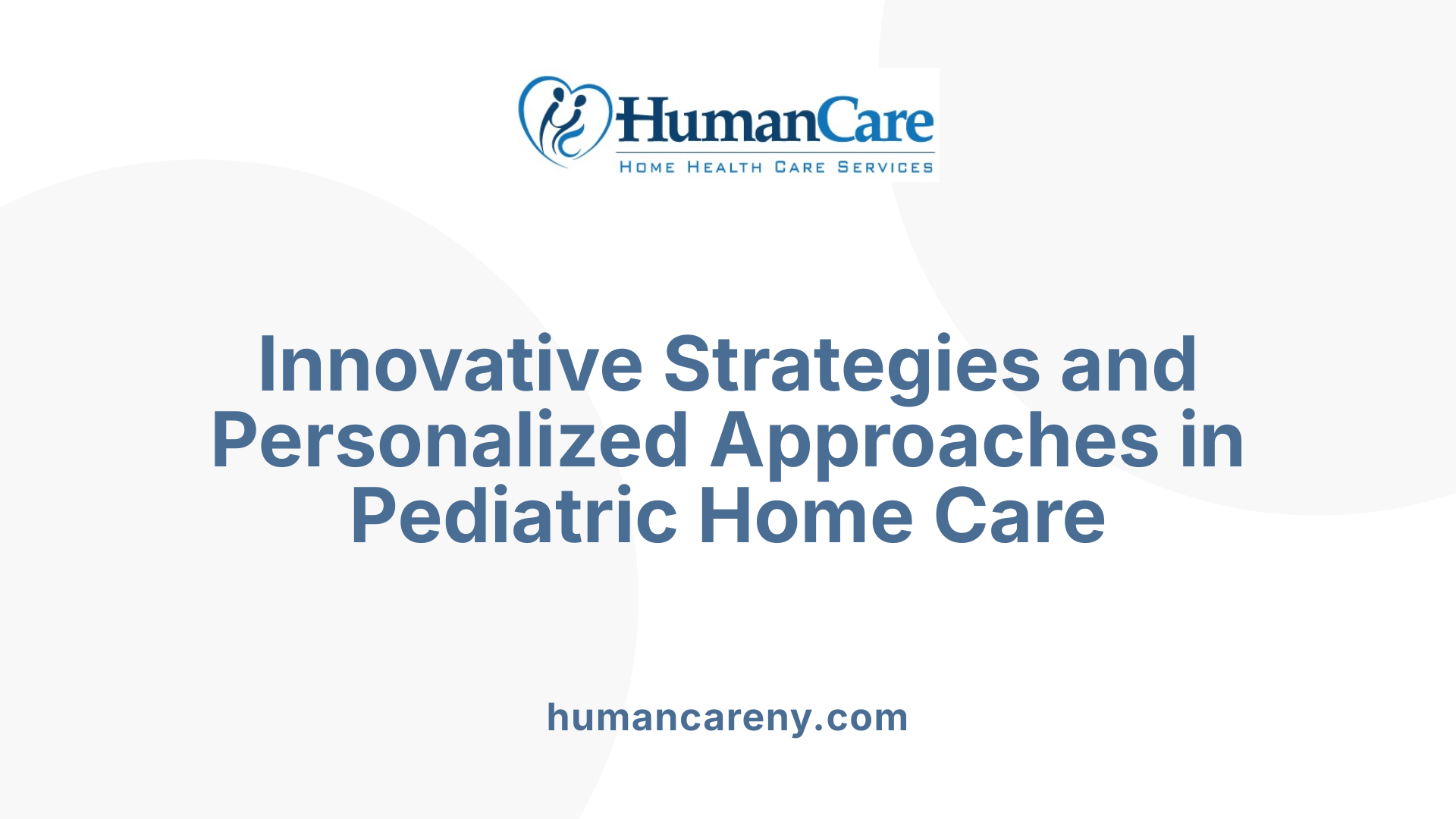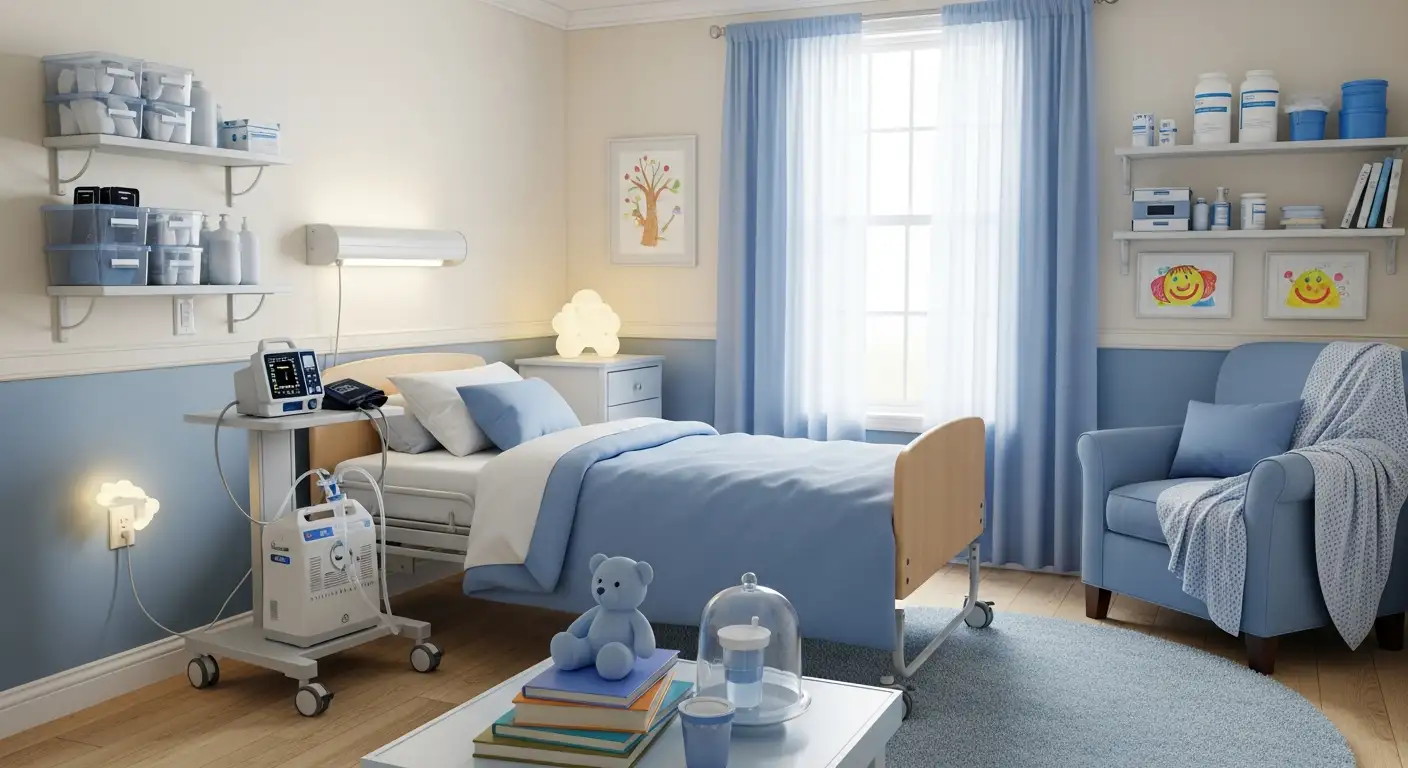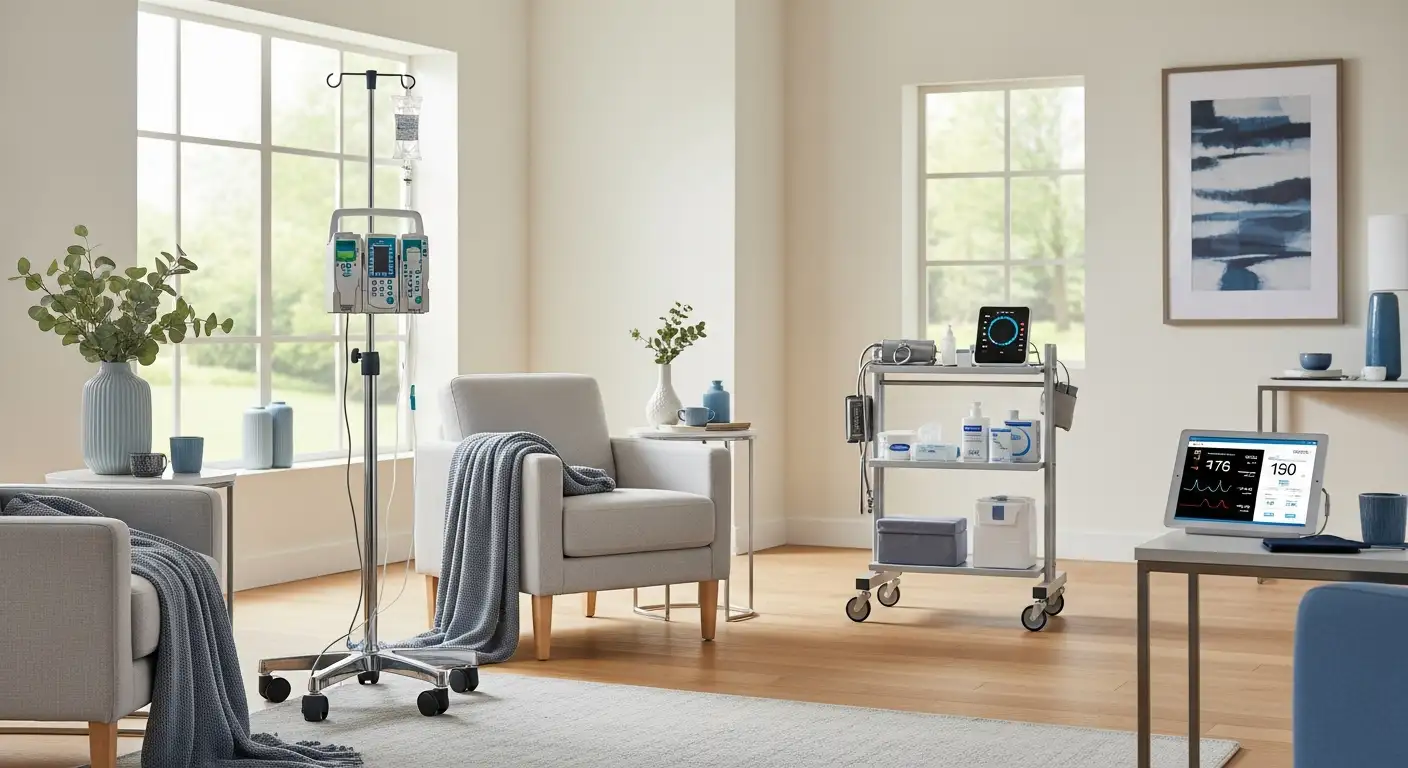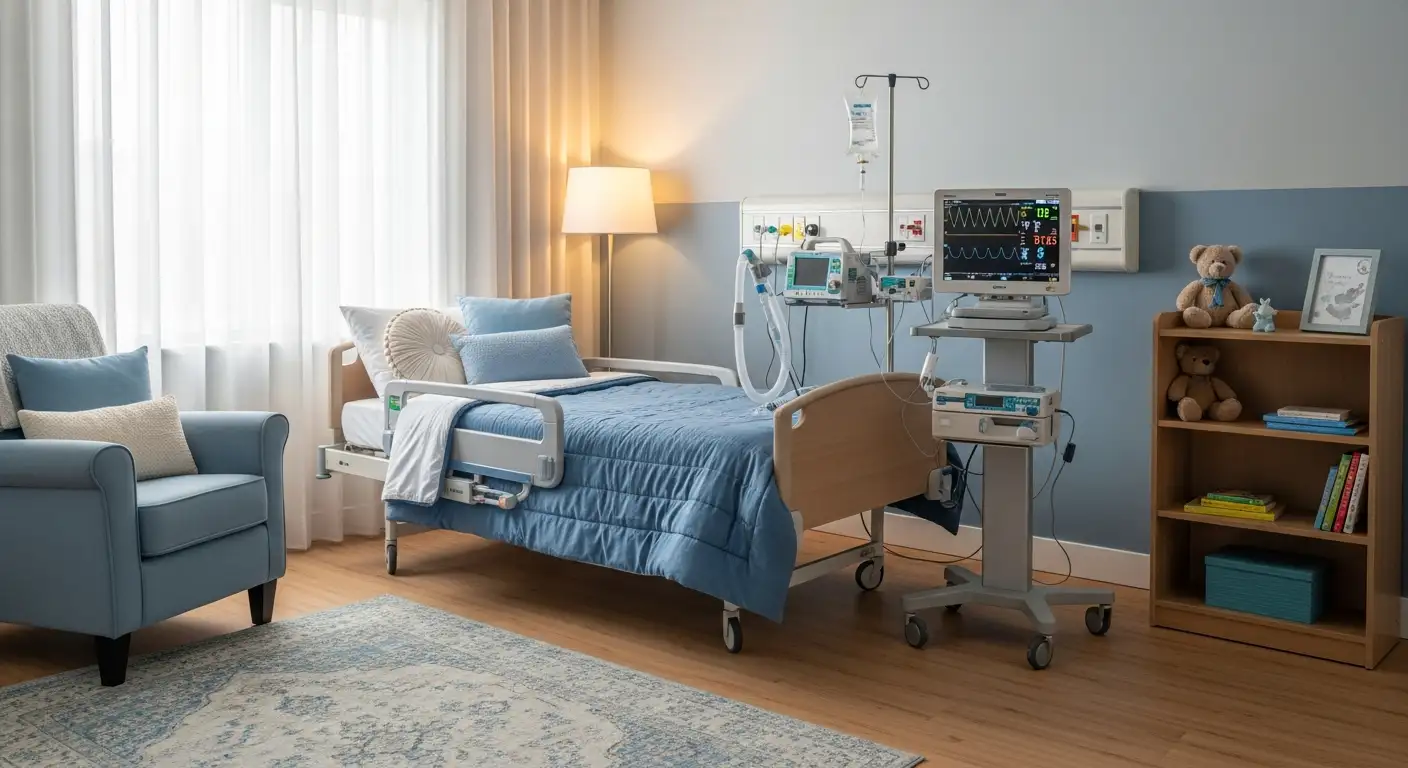A New Paradigm in Supporting Children with Neurological Conditions
Pediatric home care has become a vital component in managing neurological disorders among children, offering personalized, holistic support that aligns with the unique needs of each child and their family. This approach enables continuous care, minimizes hospital stays, and enhances the child’s quality of life by leveraging specialized medical interventions and therapeutic services delivered in the comfort of home.
Comprehensive Program Offerings for Children with Neurological Conditions
 Children with neurological conditions often require complex and specialized medical care that involves a team of healthcare professionals and a variety of support services.
Children with neurological conditions often require complex and specialized medical care that involves a team of healthcare professionals and a variety of support services.
Pediatric neurological care setups provide an array of advanced treatments and interventions tailored to each child's needs. These programs typically include clinics focused on epilepsy, cerebral palsy, encephalopathy, spina bifida, birth injuries, and traumatic brain injuries. The care is delivered in the comfort of the child's home environment whenever possible, promoting both medical stability and emotional well-being.
A multidisciplinary team—comprising pediatric neurologists, nurses, therapists, and social workers—develops individualized care plans. These plans address a spectrum of needs such as medication management, ventilator support, feeding assistance, and monitoring for seizures. Support services also include feeding tubes, suctioning, apnea monitoring, tracheostomy and ventilator management, IV therapy, and support during medical visits.
Home nursing services are tailored to address the unique challenges of children with neurological disorders like cerebral palsy, seizures, or genetic syndromes. These services incorporate skilled nursing procedures like wound care, injections, and respiratory support, all provided by trained pediatric nurses and aides.
Supporting families is a cornerstone of pediatric neurological programs. Caregivers receive detailed training for daily medical tasks and emergency procedures, which empowers families to manage care confidently at home. This approach reduces hospital visits, accelerates recovery, and encourages family bonding.
Insurance programs including Medicaid often cover these services to ensure children’s physiological health and participation in community and educational activities. The goal is to keep children safe, comfortable, and engaged in their environment, ultimately enhancing their quality of life.
Programs such as those offered by institutions like UW Health encompass comprehensive clinics, advanced therapeutics like neuromodulation and gene therapy, and support for NICU graduates. Organizations like the Child Neurology Foundation provide additional educational resources and connect families with support networks and medical providers, ensuring holistic and accessible care.
| Program Aspect | Services Offered | Additional Details |
|---|---|---|
| Medical Care | Neurology clinics, medication management, neuromodulation | Focused on epilepsy, head injuries, neurodevelopmental disorders |
| Home Care | Skilled nursing, therapies, respiratory support | Personalized at-home medical treatments |
| Support Services | Family education, support networks | Emotional, spiritual, and psychosocial support |
| Advanced Treatments | Gene therapies, NICU services | Cutting-edge interventions for neurological conditions |
Understanding and utilizing these programs can significantly improve the health, development, and overall well-being of children with neurological conditions, providing families with crucial support along their care journeys.
The Role and Advantages of Pediatric Home Care in Neurological Disorders

What are the roles and benefits of pediatric home care in managing neurological disorders?
Pediatric home care is essential for children facing neurological challenges such as cerebral palsy, seizure disorders, and brain injuries. It offers specialized, personalized medical services directly in the child's home, creating a comfortable setting that supports emotional well-being.
This type of care involves a dedicated team of healthcare professionals, including pediatric nurses, therapists, and social workers, who develop tailored treatment plans. These plans may include managing feeding tubes, providing respiratory support, administering medications, and caring for tracheostomies or ventilators.
The primary advantage of home care is its ability to ensure continuous, real-time monitoring and interventions. This reduces the need for hospital visits, preventing complications and promoting quicker recovery. Families are also trained to handle daily medical tasks, which empowers them and strengthens bonding.
Moreover, pediatric home care enhances a child's developmental progress by encouraging participation in everyday routines, supporting emotional stability, and fostering safety. It provides a holistic, family-centered approach, making it easier for caregivers to meet medical needs while maintaining their child’s dignity.
Cost-effectiveness is another benefit, as home care can lower medical expenses and hospital stays. Its flexible, tailored services support the child's healthcare needs alongside their family’s lifestyle, promoting long-term health and happiness.
In summary, pediatric home care offers a comprehensive, compassionate approach, improving health outcomes, promoting development, and enriching the quality of life for children with neurological disorders.
Supporting Children with Neurological Disorders through Home-Based Services

How does pediatric home care support children with neurological disorders?
Pediatric home care plays a crucial role in managing children with neurological disorders by delivering specialized medical and developmental services directly in the child's home environment. This setting fosters comfort and familiarity, which can be vital for children with complex needs.
Care for children with conditions such as seizure disorders, cerebral palsy, encephalopathy, and traumatic brain injuries includes therapies, medication administration, and the use of specialized equipment like feeding tubes, tracheostomies, and ventilators. This comprehensive approach helps maintain stability and promotes better health outcomes.
A personalized care plan developed by a multidisciplinary team is central to pediatric home care. Led by a pediatrician, this team often includes skilled nurses, therapists, and social workers. They collaborate to design and implement care strategies tailored to each child's specific medical and developmental needs.
One of the main benefits of home-based care is the reduction in hospital stays, which in turn decreases stress for both children and their families. Receiving treatment in a familiar and secure environment also supports emotional well-being and can speed up recovery times.
Families are trained to support ongoing care, including managing medications and medical equipment, recognizing subtle changes in their child's health, and responding to emergencies. This empowerment fosters confidence and helps ensure that children receive continuous, coordinated support.
Various programs, including Medicaid, private insurance, and community services, help families access these vital services. They aim to provide safe, effective, and family-centered care outside traditional healthcare facilities.
The goal of pediatric home care for children with neurological conditions is not only to support their medical needs but also to enhance their overall quality of life by promoting safety, independence, and developmental growth.
Methods and Strategies in Pediatric Home Care for Neurological Conditions
 In pediatric home care for children with neurological conditions, a variety of approaches and methods are employed to deliver comprehensive and individualized support. The process begins with thorough assessments that evaluate the child's medical, developmental, and psychosocial needs. These evaluations help in creating tailored treatment plans that utilize a biopsychosocial model, ensuring that medical management, therapy, and family support are integrated.
In pediatric home care for children with neurological conditions, a variety of approaches and methods are employed to deliver comprehensive and individualized support. The process begins with thorough assessments that evaluate the child's medical, developmental, and psychosocial needs. These evaluations help in creating tailored treatment plans that utilize a biopsychosocial model, ensuring that medical management, therapy, and family support are integrated.
Therapeutic interventions are a cornerstone of pediatric neurological home care. Children often receive therapies such as physical therapy to promote mobility and strength, occupational therapy to enhance daily functioning, and speech therapy to support communication. Psychological treatments, including cognitive-behavioral therapy (CBT), may be incorporated for emotional and behavioral needs. For children with functional neurological disorder (FND), specialized programs like Retraining and Control Therapy (ReACT) are employed to improve functional outcomes.
Family engagement and education are vital components of effective home care. Caregivers are trained to support medical routines, administer medications, and respond to emergencies, empowering families to manage ongoing needs confidently. Family-centered care emphasizes involving parents and guardians in decision-making and planning, aligning treatments with the child's environment and daily routines.
A multidisciplinary team approach ensures coordinated care. Neurologists, therapists, primary care providers, social workers, and other specialists collaborate regularly to monitor progress, adjust treatments, and address any emerging concerns. This team-based strategy facilitates early intervention and helps in managing complex comorbidities.
Advanced techniques are increasingly integrated into home care strategies. These include neuromodulation therapies and supportive measures such as medication management to control symptoms. Environmental enrichment—modifying the child's surroundings to promote stimulation and safety—is also utilized.
Overall, early diagnosis and customized, goal-oriented interventions are fundamental. By combining medical, therapeutic, and psychosocial strategies within a family-centered framework, pediatric home care enhances quality of life, supports development, and helps children with neurological conditions thrive in their home environment.
Impact of Pediatric Home Care on Children and Their Families
How does pediatric home care impact children with neurological disorders and their families?
Pediatric home care significantly benefits children suffering from neurological disorders, providing not only medical support but also emotional and developmental advantages. By receiving care in their familiar environment, children experience less stress and anxiety, which can positively influence their overall well-being.
This form of care allows for early recognition and management of health issues, decreasing the need for costly hospital stays and emergency interventions. Children often maintain better routines and participate more fully in daily activities, aiding their physical and emotional development.
Families play an integral role in pediatric home care. They are actively involved in providing and supporting ongoing treatment, which fosters stronger emotional bonds and encourages family autonomy. Collaboration between healthcare providers and families ensures personalized care that adapts to the child's evolving needs.
Specialized services, such as respiratory support, medication management, and therapeutic interventions, delivered at home, enhance safety and outcomes. Telehealth options and continuous monitoring help providers intervene promptly when issues arise.
Moreover, high-quality home care helps reduce caregiver stress and prevents burnout by offering training, resources, and emotional support. Families often feel more confident in managing complex needs and are reassured knowing their child’s health is being actively monitored.
Cost-wise, home care is often less expensive than prolonged hospital treatment, and it offers more comfort and convenience for the child and family. Overall, pediatric home care promotes a healthier, safer environment, fostering better developmental, social, and emotional results for children with neurological challenges and their families.
| Aspect | Impact | Additional Details |
|---|---|---|
| Health outcomes | Improved recovery, fewer hospital visits | Early detection, continuous monitoring |
| Family dynamics | Strengthened bonds, greater involvement | Family-centered care plans |
| Psychosocial effects | Reduced anxiety, increased independence | Comfort of a familiar setting |
| Cost & accessibility | Cost savings, enhanced access | Insurance coverage, telehealth options |
Research Findings and Future Directions in Pediatric Home Care for Neurological Needs
What does research say about the effectiveness of pediatric home care for children with neurological needs?
Studies show that pediatric home care significantly benefits children with neurological conditions by improving overall health outcomes and promoting developmental growth. Families often experience less stress and better bonding when children receive treatment in familiar environments. Multidisciplinary teams, including nurses, therapists, and social workers, deliver tailored services such as medication management, respiratory support, wound care, and equipment assistance, which help manage complex symptoms effectively.
Research highlights that children with neurological disorders—like cerebral palsy, seizure disorders, or brain injuries—can experience fewer hospital visits and shorter hospital stays thanks to consistent, high-quality home care. Additionally, such care arrangements support more seamless integration into daily routines and community participation, fostering independence and enhancing quality of life.
However, despite these positive findings, access to appropriate pediatric home care remains uneven. Challenges like workforce shortages, limited provider training, and communication issues can hinder delivery quality. Systems supporting palliative and psychosocial services are vital for addressing the emotional and spiritual needs of children with severe neurological impairment. Overall, while the evidence affirms the benefits, there is a pressing need for further research.
What are the current research gaps and future initiatives for pediatric home care?
Existing research gaps include a limited understanding of how home care impacts broader family well-being, service utilization patterns, and health disparities among diverse populations. There is also a need to evaluate models of care to identify the most effective structures for different settings and child needs.
Future research efforts should focus on assessing innovative interventions aimed at improving care safety, effectiveness, and health equity. Studies that explore how to better integrate home care with existing pediatric health systems are particularly important. Developing evidence around family-centered outcomes can guide improvements that truly meet the needs of both children and their caregivers.
To support these initiatives, policymakers and healthcare providers need to allocate dedicated funding, encourage collaborative data sharing, and implement training programs that enhance provider competencies. The ultimate goal is to develop scalable, equitable, and safe pediatric home care models that adapt to the evolving needs of children with neurological and other complex medical conditions.
| Aspect of Care | Current State | Future Directions | Notes |
|---|---|---|---|
| Effectiveness | Supported by evidence showing reduced hospitalizations and improved child outcomes | Need for rigorous longitudinal studies | Focus on long-term benefits and developmental measures |
| Access disparities | Significant gaps due to workforce shortages and systemic barriers | Policy reforms, workforce expansion, provider training | Addressing social and geographic disparities |
| Care models | Diverse, with fragmented implementation | Evaluation to identify best practices | Standardization and personalization of care |
| Family impact | Improved family well-being observed | Quantitative and qualitative assessment methods | Including caregiver stress and economic factors |
This ongoing research and development will support the refinement of pediatric home care, ensuring that children with neurological needs receive effective, safe, and equitable support tailored to their unique circumstances.
Challenges and Considerations in Pediatric Home Care Delivery
What are the challenges and considerations in providing pediatric home care for children with neurological disorders?
Delivering pediatric home care for children with neurological conditions is a complex and demanding task. It requires careful coordination among a multidisciplinary team of healthcare providers, including nurses, therapists, and medical specialists, to ensure seamless and effective care. Managing sophisticated medical equipment such as ventilators, feeding tubes, and monitors demands precise procedures and ongoing supervision within the home environment.
Caregivers often face substantial physical and emotional stress. They are tasked with daily medical tasks that require skill and patience, all while balancing household responsibilities and emotional strains. The financial burden can also be significant, as families may encounter gaps in insurance coverage or face high out-of-pocket expenses.
Systemic barriers pose additional hurdles. Workforce shortages mean that access to qualified home care professionals can be limited, causing delays and interruptions in essential services. Policy limitations and inadequate funding further restrict the availability and scope of home care programs.
Environmental challenges within the home, such as limited space, privacy, or temperature control, can complicate care procedures. Logistical issues like transportation barriers may hinder timely attendance at therapy or medical appointments.
Psychosocial factors also influence care quality. Many families experience feelings of guilt, loneliness, or uncertainty, especially when navigating complex care needs without sufficient support.
Overcoming these challenges requires a personalized, family-centered approach. Improving communication between families and healthcare providers is crucial. Caregivers should receive comprehensive training and ongoing education to build confidence and competence. Additionally, efforts to enhance access to resources, expand workforce capacity, and advocate for policy reforms are vital for sustaining high-quality pediatric home care services.
The Future of Pediatric Neurological Home Care
As pediatric home care continues to evolve, addressing systemic barriers, expanding access, and fostering interdisciplinary collaboration will be crucial in ensuring optimal support for children with neurological disorders. Ongoing research, innovative care models, and policy enhancements are essential to maximize the benefits of home-based care, empowering families and enhancing outcomes for the most vulnerable pediatric populations.
References
- Pediatric Palliative Care for Children with Severe ...
- Home Health Care Research for Children With Disability ...
- Pediatric Neurology Care
- Everything You Need To Know About Pediatric Home Health
- Pediatric Home Care for Complex Medical Needs
- The Role of Pediatric Home Nursing in Caring for Medically ...
- Caregiver and Provider Experiences of Home Healthcare ...
- Understanding the Long-Term Benefits of Pediatric Home ...
- Pediatric Home Health Care — What You Need to Know
- The experience of children and family in pediatric home ...



